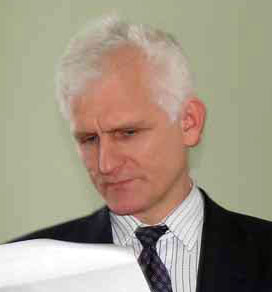Ministry of Justice refuses to register ‘Nasha Viasna’
On 3 March the representative of interests of the civil human rights association Nasha Viasna Uladzimir Labkovich received a copy of the decision of the Ministry of Justice On registration denial to the public association.
In the official answer, signed by the head of the department of civil associations A.Slizheuski it is stated that the following facts were found during the study of the filed documents: ‘The list of the members of the Revision commission of the NGO witnesses that the chairperson of the commission has not been elected, athwart the requirements of point 3.14 of the organization charter…’
‘The presented documents have a number of mismatches in, including the name of the forum at which the decision for creation of the civil association was reached. This even must be called the constituent congress, conference, general assembly or any other constituent assembly.’ From this remarks one can see that the Ministry of Justice has spent much time to find at least any reasons for the registration denial.
The conclusions of the state officials about the floor space where the constituent assembly of human rights activists took place are also quite interesting: ‘From the materials of the registration case of the owner of the office it is clear that the total area of the office is 35 square meters. It means that there was about 35:67 = 0.5 square meters for each participant of the Assembly If we take into account the layout of the office, and the fact that there are several furnished working places there, including computer appliances, etc., the space for each participant of the Assembly becomes even less than the abovementioned one. That’s why it is unclear how in such conditions one can accommodate 67 people and guarantee their right to express their free will in conformity with Article 4 of the Law On civil associations, and place there the presidium of the Assembly, organize the work of the assembly during one hour with calculation of votes and lead the minutes of the Assembly…’
What can one tell in response? Such scrupulous creative calculations of the officers of the Ministry of Justice can cause only admiration with such original approach to the registration process and care about participants of the assembly! But there also traditional pretensions in the registration denials: the Ministry of Justice again dislikes the way the payment of the financial fee was executed and the fact that the organization founders have received administrative or criminal punishments, from which the conclusion that 53.7% of them are not law-abiding citizens and the real aims of the established NGO are concealed, which contradicts to the principle of publicity.
Bear in mind that the constituent assembly of the civil human rights association Nasha Viasna took place on 18 January in Minsk and on 26 January the corresponding documents were submitted to the Ministry of Justice. The new human rights organization is the successor of the republican human rights NGO Human Rights Center ‘Viasna’ that was liquidated by the Supreme Court of Belarus in October 2003. Meanwhile, the human rights activists continued their activities. That’s why Nasha Viasna was founded by former members of Viasna from different parts of the country. The head of the organization is the well-known human rights activist, vice-president of the International Federation for Human Rights (FIDH) Ales Bialiatski.
The Ministry of Justice missed the legal term for answering to the application for registration (one month). On 26 February the lawyer Uladzimir Labkovich phoned to the specialist of the Ministry of Justice Alexander Kharyton, who said that the documents to the organization founders hadn’t been sent and he knew nothing concrete about it. He only advised that Mr. Labkovich phoned him from time to time if there was such a possibility.


















